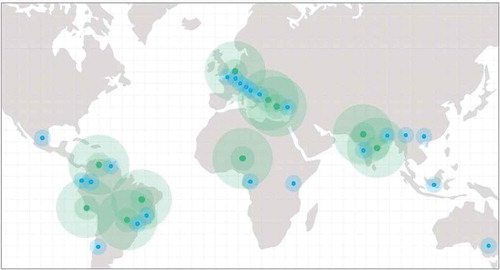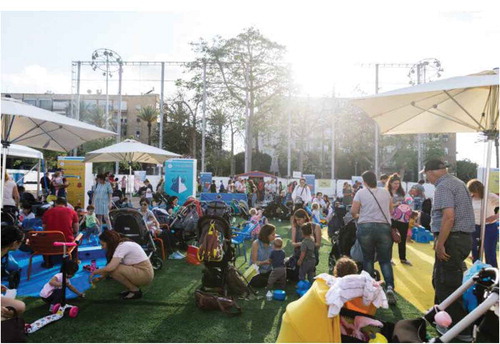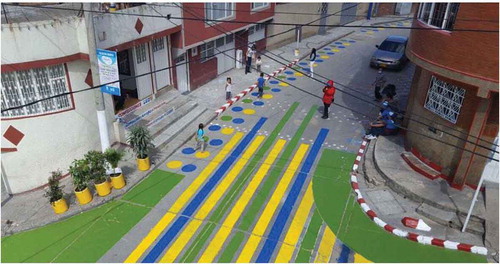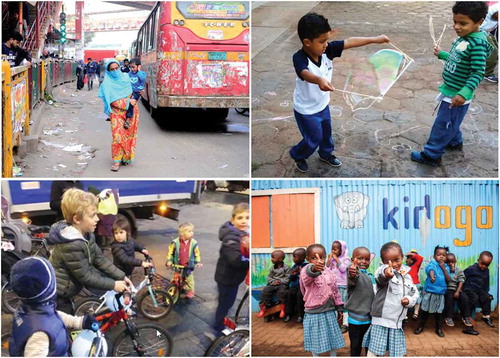RESEARCH FOR CITY PRACTISE
Decades of research make clear: children’s early experiences in life have lasting effects on their odds of good health and success in school, work and life. It is during early childhood that the foundational architecture of the brain is laid, and when one’s immediate surroundings can determine how the brain develops. The built environment impacts physical, cognitive, socio-emotional development, as well as family well-being, on which young children rely so much. This article highlights selected initiatives connecting urban planning and design to healthy child development that the Bernard van Leer Foundation has supported through its Urban95 initiative. This aims to demonstrate how there is no single guideline for a child-friendly city, but rather a set of principles and ideas, through the example of some partner cities such as Tel Aviv, Istanbul, Bhubaneswar and Bogotá.
If you could see the city from 95cm – the average height of a healthy 3-year old – what would you change?
‘Young kids’ health and quality of life depend on factors like access to quality child care, safe streets, and thriving neighbourhoods with places to play. These words from Bernard van Leer Foundation executive director Michael Feigelson explain the Urban95 initiative to incorporate a focus on early childhood development into the design, planning and management of cities. Urban95 is the Foundation’s initiative launched in 2016 to bridge early childhood and urban sectors.
Figure 1. Map of Urban95’s geographical reach. Developed by the Bernard van Leer Foundation. Legend: in green, Urban95 pioneering cities, current and projected; in blue, 2016 Urban95 Challenge winners.

Figure 2. Photo from the Play in the City, an Urban95 event on Rabin Square in Tel Aviv on 15 May 2018. Photo courtesy of Shani Halevy.

Figure 3. Photo from the Crezco con mi barrio pilot project for Urban95 in Bogotá, displaying tactical urbanism interventions meant at increasing safety and play opportunities in the community.

Figure 4. Photos from Urban95 Challenger winners. Top left: Dhaka, Bangladesh. Top right: Uberaba, Brazil. Bottom left: Torino, Italy. Bottom right: Nairobi, Kenya.

Decades of research are clear: children’s early experiences in life have lasting effects on their odds of good health and success in school, work and life. Cities can be wonderful places to grow up, rich with opportunities for learning. Yet, urban environments offer unique challenges for families with young children, making crucial that urban decision-makers keep their specific needs in mind.
Several factors impact the physical, cognitive, linguistic and socio-emotional development of a child. Early Childhood Development (ECD) is a process and, while each child is unique, general patterns of development are similar. It is during early childhood that the foundational architecture of the brain is laid, and all development throughout life builds on the capacities established in early childhood.
Early childhood is a time when one’s immediate surroundings help determine how the brain and body develop. Infants and toddlers have limited freedom of movement, which makes their immediate environment and where their parents bring them even more important (Goldfeld et al. Citation2014). It is, therefore, important to plan, design and manage a built environment that reduces stress for both caregivers and child, and fosters healthy development by supporting positive interactions between young children and their caregivers. This includes a safe, healthy, green and playable environment but also walkable, vibrant and comfortable routes to services.
The built environment impacts all aspects of ECD: physical, cognitive, socio-emotional development as well as family well-being, on which young children rely so much.
NOTE: Socio-Economic Status (SES) is the strongest factor for individual differences in child development (Christian et al. Citation2017). Yet SES tends to be spatially segregated and lower SES usually have lower-quality physical environments. Focusing on disadvantaged neighbourhoods therefore makes sense but focusing on the built environment is not the only solution and should be bundled with larger welfare and social policies for sustained impact.
Urban95 is the Bernard van Leer Foundation’s initiative to make lasting change in the landscapes and opportunities that shape children’s lives – from the prenatal period to age 5.
With an objective of partnering with 10 pioneering cities around the world by 2020, the initiative has already reached nine from Bogotá to Bhubaneswar including Pune, Udaipur, Tel Aviv, Istanbul, Recife, Boa Vista and Piura (). While it started with a strong advocacy component, the Urban95 initiative has now moved towards connecting key implementers and sharing lessons learned. The initiative does not provide guidelines but rather supports through funding, knowledge and technical assistance the integration of early childhood in on-going urban policies or projects.
Each Urban95 City has its own arrangement based on local priorities, contextual factors and governance systems. For example, Recife has a strong violence prevention component while Bhubaneswar focuses on infrastructure. In addition to working directly with cities on our focus areas: public space, mobility, early childhood services and data-driven management, the Urban95 initiatives has launched the Urban95 Challenge, a competition that led 26 winning projects around the world to be supported by small grants. Finally, the initiative also curates and shares knowledge about the intersection between early childhood and the urban sector through events and knowledge products, such as the Urban95 Starter Kit, meant to facilitate a conversation on early childhood within city governments.
This City Short aims to provide insight on initiatives representing the diversity of ways to connect urban planning and design to early childhood development. The text that follows covers work happening in Urban95 Cities, projects that came out of the Urban95 Challenge and a few implementation ideas for prospective Urban95 cities from the Urban95 Starter Kit.
Urban95 Cities
A city becomes Urban95 when there is a formal agreement between the Bernard van Leer Foundation and the city’s political leadership, and when it is implementing policies aimed at coaching parents, in addition to a policy focusing on public space and/or mobility with a specific focus on early childhood. In addition, the city is working on collecting relevant data on early childhood and using it to coordinate projects across departments. On top of that, each city develops Urban95 based on local priorities and context. The foundation supports city governments through funding, technical assistance, trainings and networking opportunities. We focus on supporting cities to integrate early childhood into their planning processes to scale the impact on young children.
Tel Aviv-Yafo, Israel
Young children have become a cross-cutting strategic priority for Tel Aviv-Yafo, following a partnership agreement between the municipal government, the Bernard van Leer Foundation, Bloomberg Philanthropies and the Tel Aviv Foundation.
Tel Aviv became in 2017 one of the first cities to embark on a strategic Urban95 partnership. The programme’s manager is now embedded in the city administration, working across various departments. The partnership has now reached a stage where innovations are happening independently from the Foundation’s investments, whether from Parks & Recreation (play equipment design) to Community Departments (online platform to connect parents), and the Director General of the Municipality has referred to Urban95 as ‘a way of life’.
The initiative has gathered critical mass in the city with the organisation of a large three-day play event on the country’s main square, Rabin Square, in May 2018, which sent a strong symbolic signal about the importance of early childhood for the municipality ().
Istanbul, Turkey
The Urban95 partnership aims to strengthen the capacities of four district municipalities – Sarıyer, Maltepe, Sultanbeyli and Beyoğlu – in collaboration with two major universities, Boğaziçi and Kadir Has. The partnership includes:
Home visits by parent coaches to families with young children
A collaboration with Columbia University School of Architecture’s Studio X to develop model public spaces and playgrounds for young children and their caregivers
An innovative set of maps by the Turkish Economic and Social Studies Foundation (TESEV) to identify the most vulnerable young children. It crossed real-estate prices with location of key early childhood services (such as healthcare, parks, childcare) to pinpoint areas with the highest need for municipal interventions in early childhood. You can consult these maps on this website: http://belediye.istanbul95.org/.
Both the home visits and the public space improvements will be evaluated to understand their impact on young children, their caregivers, and the interaction between the two, as well as the long-term economic impact.
Bhubaneswar, India
Bhubaneswar topped the list of India’s Smart Cities Mission’s winners in 2016. This was in part because of the city’s ambition to become India’s first child-friendly smart city, having become the first Urban95 partner city.
In collaboration with the National Institute of Urban Affairs in New Delhi, the Foundation set-up and is funding the Child-Friendly Smart City Centre, which is now part of the Bhubaneswar Development Authority. The centre is providing technical and capacity building support to urban planners and municipal staff, working to create guidelines, regulations and best practices. It is working on retrofitting city parks, mapping where children and families live in the city and what services are available to them, and exploring how to improve traffic management on selected streets near schools.
Bogotá, Colombia
Bogotá Urban95 aims to create public spaces that promote active and healthy living, and street furniture designed for children aged under 5 years, their parents, and pregnant and breastfeeding women.
Its pilot project – Crezco con mi barrio – is in Ciudad Bolívar district (), a low-income area selected by data analysis. A cable car is being built in the area, which will reduce travel time to the highest point from 1 h to 15 min.
The city government is also looking to involve the community in solving problems such as lack of recreational and childcare areas, increasing use and enjoyment of public spaces, and improving pedestrian safety, with the support of Juntas de Acción Comunal (JAC), an institution in charge of representing local people’s needs.
Urban95 Challenge
In 2016, the Bernard van Leer Foundation issued the Urban95 Challenge: a global call for innovations to promote well-being for young children and their families in the places where they live, learn, work and play.
In response, 151 ideas poured in from 41 countries (). Here is a list of some of these innovations and how they relate to health. The chronological span of the Urban95 Challenge is 2 years, from 2016 to 2018. The projects are, therefore, under implementation or recently completed, and we are currently evaluating them and synthesising learnings. In doing so, we are focusing on how they impacted caregiver-child interactions, which is at the core of healthy brain development for babies and toddlers.
Every project is small scale and is meant to act as a learning opportunity for us to refine the Urban95 initiative’s base concept.
Encouraging outdoor play in Uberaba
Uberaba, Brazil
Despite the presence of a public square every 400 m in Uberaba, children and families have gotten out of the habit of using them to gather, connect and play. This project revitalises three squares in low-income suburban neighbourhoods, using activities to overcome fears related to outdoor play, such as tree climbing, mud pools and planting edible gardens.
Safer road crossings in Mexico City
Mexico City, Mexico
While data exist on where and when fatal accidents with cars and children are most likely to happen, it is hard to access. This project maps these data and makes them publicly available, giving city authorities the information to consider changes in the design of the most dangerous crossings.
Tackling noise pollution in Dhaka
Dhaka, Bangladesh
Studies show that noise pollution affects child development, increasing blood pressure and stress hormones and undermining the ability to learn. This project measures the effects on children, campaign to raise awareness, and develop a strategy paper on possible interventions. It aims to align stakeholders – local government, the public and NGOs.
Gathering data to inform policy in Surakarta
Surakarta, Indonesia
The city developed a vision of a more inclusive and child-friendly city, tackling issues such as how a lack of playgrounds forces children to play in unsafe street areas. This project gathers data, through mapping and workshops, on how parents and young children use their neighbourhoods. Project leaders will create a series of data visualisations to persuade city decision-makers of the need for action.
Reclaiming garden zones for young children in Antwerp
Antwerp, Belgium
Garden zones in front of houses combine the proximity, protection and intimacy of the home with access to public life, yet have often been neglected. This project looks at how young children can reclaim them. It involves young children, communities and professionals in two different social contexts in Antwerp and Mechelen to develop planning guidelines.
Improving air quality in Torino
Turin, Italy
The project works with residents of the neighbourhood of Vanchiglia to raise awareness of the problem and develop new ways to measure air pollution in areas children use, such as walking routes to kindergarten. The aim is to persuade the city’s government to take action.
Improving informal childcare in Kibera
Nairobi, Kenya
Over 60% of Kenya’s urban population currently lives in informal settlements like Kibera, without formal childcare services for children aged under 3. Infants are often left in informal babycare centres, with untrained caregivers. Kidogo, a social enterprise, is training and mentoring local mamapreneurs to provide higher quality, sustainable childcare micro-businesses. This project will enable Kidogo to refine and test the scalability of this innovative model.
Closing streets in Libreville for children to play
Libreville, Gabon
Libreville lacks dedicated play areas for young children, and streets are typically unsafe for them to play on. This project trials the idea of closing identified streets on certain days to organise games and play for young children, potentially involving movable structures such as sand pits.
An Urban95 Starter Kit: key ideas for action
Based on the projects outlined above and other partners we have engaged with on global level for research and advocacy, we have identified 29 ideas, which we have consolidated in the Urban95 Starter Kit. The Starter Kit is a starting point to spark discussion and planning and to illustrate what could be possible, rather than a full do-it-yourself manual. It is composed of 29 ideas divided into four categories: Public Space, Mobility, Early Childhood Services and Data-driven management. It ends on a comprehensive place-based proposal currently being tested in Bogotá and Recife: the children’s priority zone.
Children’s priority zones
The children’s priority zone is a neighbourhood-based approach to healthy child development. It starts by creating a perimeter around an ‘anchor institution’ that families often visit and progressively introducing new activities, services and features to make the area better for babies, toddlers and those who care for them. It includes measuring how these improvements change lives overtime – increase in outdoor play, better air quality, more people resorting to active transportation modes such as walking and cycling, and parents connecting more frequently and longer with their children.
The Urban95 Starter Kit’s ideas range from pop-up play in the public space to data dashboards on early childhood for city management. It also includes traffic calming, children routes, designing for play, or planting a tree for every baby. While being varied in its content, it is targeted at city government officials, whether in decision-making position or mid-level management, to ignite a discussion on babies and toddlers in planning and design. It can also be used by community organisations, research institutions or architects and designers looking for new ideas.
Next steps for Urban95 include refining the Urban95 Starter Kit through a test phase, and a second version for early 2019. We are also planning on consolidating our work with cities, focusing more closely on pieces of content such as mobility and air quality to strengthen our evidence base, and diving deeper into monitoring and evaluating by developing and improving on our indicators.
Throughout its project and partner cities, the Urban95 initiative is fostering and expanding the link between early childhood development and urban planning, design and policy, and offering a new, comprehensive lens to look at the health of babies, toddlers, their caregivers and ultimately everyone sharing the urban space.
Disclosure statement
No potential conflict of interest was reported by the author.
Additional information
Notes on contributors
Julien Vincelot
Julien Vincelot As Urban95 Coordinator, Julien contributes to the development of Urban95 strategy and manages the Urban95 Starter Kit, as well as global Urban95 partnerships and projects related to public space and mobility. Julien holds a dual MSc in Urban Policy and Planning from the London School of Economics and SciencesPo Paris. He has academic and/or professional experience in India, China, France, Mexico, the United Kingdom and the Netherlands.
References
- Christian, H., et al., 2017. Relationship between the neighbourhood built environment and early child development. Health & place, 48, 90–101. doi:10.1016/j.healthplace.2017.08.010
- Goldfeld, S., et al., 2014. Neighbourhood effects influencing early childhood development: conceptual model and trial measurement methodologies from the kids in communities study. Social indicators research, 120 (1), 197–212. doi:10.1007/s11205-014-0578-x
